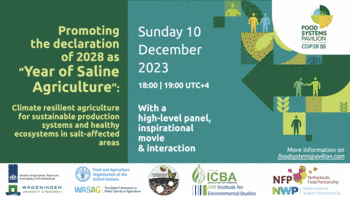WASAG at COP28 – Promoting the declaration of 2028 as “Year of Saline Agriculture”: Climate resilient agriculture for sustainable Production Systems and healthy ecosystems in salt-affected areas
Date: Sunday, December 10, 2023, 18:00-19:00 UTC+4, Food System Pavilion of the COP28, Expo city, Dubai
Background
According to the recent estimates of FAO, almost 1.4 billion hectares of soils are currently salt-affected and over one billion hectares are at risk of salinization. In addition, a reduction in rainfall and increase in temperature have led to prolonged droughts that cause a decline in water quality and induce salinity in the groundwater reservoirs.
With sea level rise, due to climate change, flooding by seawater will increase, reaching further inland than previously, affecting agriculture and water quality in soils and aquifers. The impacts of salinity on agriculture are devastating; not only does it affect production, but also the balance of the ecosystems, the quality of natural resources and rural livelihoods. The most important impact that salinity has on crop production is a significant drop in yields as most of our crops are salt-sensitive. While the traditional approach has been to fight salinity and rehabilitate salinized soils requiring additional water to leach salts, a more sustainable approach is to adjust farming systems to higher salinity levels. Coastal aquifer and soil salinity management are key to sustaining agricultural crop productivity.
With the human population projected by the UN to keep growing to reach 9.1 billion in 2050, a 50 percent surge in food demand is expected by that time: thus, alternative food sources have to be considered through unconventional farming approaches.
Saline agriculture represents an opportunity to practice a new type of farming in an unconventional way by implementing many different strategies, but specifically focusing on growing salt-tolerant varieties of conventional crops and halophytes (highly salt-tolerant plants). These crops can be combined in an integrated approach with livestock and aquaculture to minimize external inputs through nutrient and water recycling, decrease the ecological footprint and promote biodiversity. In any case, proper soil and water management practices should be applied to secure the sustainability of natural resources and the longevity of farming schemes.
The technical session brought together professionals and experts representing governments and prominent international organizations, which showcased the benefits of saline agriculture and its potential for adaptation to climate change. It aimed to establish the United Nations (UN) “Year of Saline Agriculture” initiative for the year 2028.
Objective
i. To raise awareness on the importance and benefits of saline agriculture;
ii. To provide evidence to support investment and policy development for saline agriculture in the context of climate change;
Watch the recording of the session here:
Agenda
Moderator: Meike van Ginneken, Water Envoy for the Kingdom of the Netherlands
Opening remarks – Meike van Ginneken, Water Envoy for the Kingdom of the Netherlands
High-level panel discussion:
- Donné Slangen, Vice Minister for Nature and Nitrogen Policy, Kingdom of the Netherlands
- Dionysia Angeliki Lyra, Senior Scientist, ICBA
- Michael Baum, Deputy Director General, ICARDA
- Thanawat Tiensin, Director, NSA Division, FAO
Presentation of the movie: Promoting the declaration of 2028 as “Year of Saline Agriculture”
Interactive session with the audience
Concluding remarks: Meike van Ginneken, Water Envoy for the Kingdom of the Netherlands

